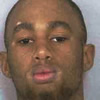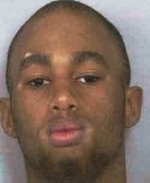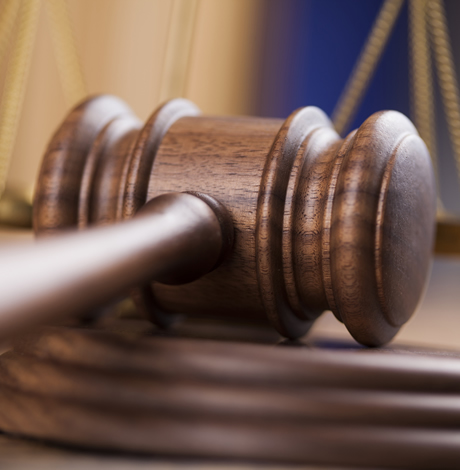Local
Man charged in Tony Hunter death back in jail
Robert Hannah arrested for alleged assault, drug possession

D.C. resident Robert Hannah, 20, who served six months in jail in connection with the Hunter case, was being held in jail this week for an arrest last month for allegedly assaulting his girlfriend.
The United States Attorney’s office asked a D.C. Superior Court judge to hold Hannah in custody on a misdemeanor assault charge, which it listed as an incident of domestic violence, following Hannah’s arrest earlier this year on a separate charge of possession of marijuana.
Hannah was scheduled to appear in court on Thursday for a status hearing. A judge was expected to decide whether he should continue to be held or be released while awaiting trial on the assault charge.
His latest arrests drew the attention of LGBT activists, who expressed outrage in July 2009 when a grand jury lowered the charge against Hannah from manslaughter to misdemeanor simple assault for his role in Hunter’s death.
Prosecutors with the U.S. Attorney’s office said they could not support a manslaughter charge, let alone a first or second-degree murder charge against Hannah, because the evidence in the case didn’t support those charges.
Police and prosecutors stated in court papers that Hannah punched Hunter in the face as the two crossed paths on the street. They said the “altercation” occurred while Hunter and a friend were walking from their car to BeBar, a gay bar on 9th Street, N.W. near the D.C. Convention Center that has since closed.
According to court records, Hannah told police at the time he was arrested in the case that he punched Hunter in self-defense after Hunter touched his crotch and buttocks in a sexually suggestive way. A witness on the scene backed up Hannah’s claim of being groped, the police report said.
However, a friend of Hunter, who said he was walking with Hunter at the time of the assault, said Hunter never touched Hannah and that Hannah and two or three other men assaulted him and Hunter in an unprovoked attack.
For nearly a year, LGBT activists criticized police and prosecutors for appearing to accept Hannah’s version of what happened. They said Hannah appeared to be invoking the so-called “gay panic” defense, in which criminals who attack gay men claim to have been sexually propositioned as an alibi.
Hannah, then 18, accepted an offer by the U.S. Attorney’s office to plead guilty to the simple assault charge. A judge later sentenced him to the maximum penalty of six months in jail for that charge.
Shortly before the sentencing, the U.S. Attorney’s office released a 14-page sentencing memorandum explaining its decision against pursuing charges of murder or manslaughter against Hannah. Among other things, the document noted that an autopsy found that Hunter was intoxicated at the time of the assault. It said the D.C. medical examiner found that a facial injury that Hunter received from being punched by Hannah was superficial and did not seriously injure him.
According to the police and medical examiner’s report, Hunter fell against a fence after being punched and stood up on his own before losing his balance and falling backwards to the ground, hitting his head on the pavement. The force of his head hitting the pavement caused a fatal brain injury that led to his death, the medical examiner concluded.
Assistant U.S. Attorney Kevin Flynn, who prosecuted the case against Hannah, told a November 2009 community meeting organized by the local group Gays and Lesbians Opposing Violence (GLOV) that the medical examiner’s report would have been used by the defense in a trial. Flynn said a jury would almost certainly have found Hannah not guilty of murder or manslaughter based on that evidence, especially the medical examiner’s assertion that Hunter’s intoxication from alcohol contributed to a loss of balance that led to his fall to the pavement.
Flynn stated in the sentencing memorandum that Hunter’s friend, who claimed the attack by Hannah was unprovoked, gave a series of conflicting statements to police that raised serious questions about his reliability as a witness had the case gone to trial.
GLOV official Christopher Farris disputes Flynn’s claim that the friend was unreliable, saying conflicting statements about a traumatic event that led to Hunter’s death shouldn’t be dismissed and could have been helpful at a trial. Farris questioned the U.S. Attorney’s office and D.C. police for failing to more aggressively pursue leads to determine whether Hannah and others who were with him targeted Hunter as a gay man.
Residents in nearby neighborhoods knew gays were arriving and leaving the area to patronize BeBar, which was well known as a gay club, Farris and other activists said.
Shaw neighborhood activist Ricky Williams, who alerted activists and the media about Hannah’s latest arrests through a series of e-mails, called on the U.S. Attorney’s office to vigorously prosecute Hannah in the current two cases.
“There is no reason why a man thrice charged with violent crimes should be able to walk the streets of my neighborhood as if nothing ever happened,” he said in one e-mail. “How many more people must suffer before anyone does anything about Mr. Hannah?”
Assistant U.S. Attorney Roger Kemp, who is prosecuting Hannah in the current two cases, called on community members to submit to the court community impact statements at the appropriate time to explain how Hannah may have had a negative impact on the community.
William Miller, a spokesperson for the U.S. Attorney’s office, said community impact statements are submitted only if and when a defendant is convicted of a crime and is about to be sentenced by a judge.
“If he is convicted, the statements would be helpful in advance of sentencing, giving the U.S. Attorney’s Office and the court additional information that could be useful,” Miller told the Blade. “Of course, all defendants are presumed innocent until, and unless, proven guilty.”
Virginia
Arlington LGBTQ bar Freddie’s celebrates 25th anniversary
Owner asks public to support D.C.-area gay bars

An overflowing crowd turned out Sunday night, March 1, for the 25th anniversary celebration of Freddie’s Beach Bar, the LGBTQ bar and restaurant located in the Crystal City section of Arlington, Va.
The celebration began as longtime patrons sitting at tables and at the bar ordered drinks, snacks, and full meals as several of Freddie’s well-known drag queens performed on a decorated stage.
Roland Watkins, an official with Equality NoVa, an LGBTQ advocacy organization based in the Northern Virginia areas of Arlington, Alexandria, and Fairfax County, next told the gathering about the history of Freddie’s Beach Bar and the role he said that owner Freddie Lutz has played in broadening the bar’s role into a community gathering place.
“Twenty-five years ago, opening a gay bar in Arlington was not a given,” Watkins told the crowd from the stage. “It took courage, convincing, and a deep belief that our community belongs openly, visibly, and proudly,” he said. “And that belief came from Freddie.”
Watkins and others familiar with Freddie’s noted that under Lutz’s leadership and support from his staff, Freddie’s provided support and a gathering place for LGBTQ organizations and a place where Virginia elected officials, and candidates running for public office, came to express their support for the LGBTQ community.
“Over the past 25 years, Freddie’s has become more than a bar,” Watkins said. “It has become a community maker.”
Lutz, who spoke next, said he was moved by the outpouring of support from long-time customers. “Thank you all so much for coming tonight and thank you all so much for your support over the past 25 years,” he said. “I can’t tell you how much that means to me and how much it’s kept me going.”
But Lutz then said Freddie’s, like many other D.C. area gay bars, continues to face economic hard times that he said began during the COVID pandemic. He noted that fewer customers are coming to Freddie’s in recent years, with a significant drop in patronage for his once lucrative weekend buffet brunches.
“So, I don’t want to be the daddy downer on my 25-year anniversary,” he said. “But this was actually the worst year we’ve ever had,” he added. “And I guess what I’m asking is please help us out. Not just me, but all the gay bars in the area.” He added, “I’m reaching out and I’m appealing to you not to forget the gay bars.”
Lutz received loud, prolonged applause, with many customers hugging him as he walked off the stage.

In an official statement released at the reveal event Capital Pride Alliance described its just announced 2026 Pride theme of “Exist, Resist, Have the Audacity” as a “bold declaration affirming the presence, resilience, and courage of LGBTQ+ people around the world.”
The statement adds, “Grounded in the undeniable truth that our existence is not up for debate, this year’s theme calls on the community to live loudly and proudly, stand firm against injustice and erasure, and embody the collective strength that has always defined the LGBTQ+ community.”
In a reference to the impact of the hostile political climate, the statement says, “In a time when LGBTQ+ rights and history continue to face challenges, especially in our Nation’s Capital, where policy and public discourse shape the future of our country, together, we must ensure that our voices are visible, heard, and unapologetically centered.”
The statement also quotes Capital Pride Alliance CEO and President Ryan Bos’s message at the Reveal event: “This year’s theme is both a declaration and a demand,” Bos said. “Exist, Resist, Have Audacity! reflects the resilience of our community and our responsibility to protect the progress we’ve made. As we look toward our nation’s 250th anniversary, we affirm that LGBTQ+ people have always been and always will be part of the United States’s history, and we will continue shaping its future with strength and resolve,” he concluded.
District of Columbia
Capital Pride board member resigns, alleges failure to address ‘sexual misconduct’
In startling letter, Taylor Chandler says board’s inaction protected ‘sexual predator’

Taylor Lianne Chandler, a member of the Capital Pride Alliance Board of Directors since 2019 who most recently served as the board’s secretary, submitted a letter of resignation on Feb. 24 that alleges the board has failed to address instances of “sexual misconduct” within the Capital Pride organization.
The Washington Blade received a copy of Chandler’s resignation letter one day after she submitted it from an anonymous source. Chandler, who identifies as transgender and intersex, said in an interview that she did not send the letter to the Blade, but she suspected someone associated with Capital Pride, which organizes D.C.’s annual LGBTQ Pride events, “wants it out in the open.”
“It is with a heavy heart, but with absolute clarity, that I submit my resignation from the Capital Pride Alliance Board of Directors effective immediately,” Chandler states in her letter. “I have devoted nearly ten years of my life to this organization,” she wrote, pointing to her initial involvement as a volunteer and later as a producer of events as chair of the organization’s Transgender, Gender Non-Conforming, and Intersex Committee.
“Capital Pride once meant something profound to me – a space of safety, visibility, and community for people who have often been denied all three,” her letter continues. “That is no longer the organization I am part of today.”
“I, along with other board members, brought forward credible concerns regarding sexual misconduct – a pattern of behavior spanning years – to the attention of this board,” Chandler states in the letter. “What followed was not accountability. What followed was retaliation. Rather than addressing the substance of what was reported, officers and fellow board members chose to chastise those of us who came forward.”
The letter adds, “This board has made its priorities clear through its actions: protecting a sexual predator matters more than protecting the people who had the courage to come forward. … I have been targeted, bullied, and made to feel like an outsider for doing what any person of integrity would do – telling the truth.”
In response to a request from the Blade for comment, Anna Jinkerson, who serves as chair of the Capital Pride board, sent the Blade a statement praising Taylor Chandler’s efforts as a Capital Pride volunteer and board member but did not specifically address the issue of alleged sexual misconduct.
“We’re also aware that her resignation letter has been shared with the media and has listed concerns,” Jinkerson said in her statement. “When concerns are brought to CPA, we act quickly and appropriately to address them,” she said.
“As we continue to grow our organization, we’re proactively strengthening the policies and procedures that shape our systems, our infrastructure, and the support we provide to our team and partners,” Jinkerson said in her statement. “We’re doing this because the community’s experience with CPA must always be safe, affirming, empowering, and inclusive,” she added.
In an interview with the Blade, Chandler said she was not the target of the alleged sexual harassment.
She said a Capital Pride investigation identified one individual implicated in a “pattern” of sexual harassment related behavior over a period of time. But she said she was bound by a Non-Disclosure Agreement (NDA) that applies to all board members and she cannot disclose the name of the person implicated in alleged sexual misconduct or those who came forward to complain about it.
“It was one individual, but there was a pattern and a history,” Chandler said, noting that was the extent of what she can disclose.
“And I’ll say this,” she added. “In my opinion, with gay culture sometimes the touchy feely-ness that goes on seems to be like just part of the culture, not necessarily the same as a sexual assault or whatever. But at the same time, if someone does not want those advances and they’re saying no and trying to push you away and trying to avoid you, then it makes it that way regardless of the culture.”
When asked about when the allegations of sexual harassment first surfaced, Chandler said, “In the past year is when the allegation came forward from one individual. But in the course of this all happening, other individuals came forward and talked about instances – several which showed a pattern.”
Chandler’s resignation comes about five months after Capital Pride Alliance announced in a statement released in October 2025 that its then board president, Ashley Smith, resigned from his position on Oct. 18 after Capital Pride became aware of a “claim” regarding Smith. The statement said the group retained an independent firm to investigate the matter, but it released no further details since that time. Smith has declined to comment on the matter.
When asked by the Blade if the Smith resignation could be linked in some way to allegations of sexual misconduct, Chandler said, “I can’t make a comment one way or the other on that.”
Chandler’s resignation and allegations come after Capital Pride Alliance has been credited with playing the lead role in organizing the World Pride celebration hosted by D.C. in which dozens of LGBTQ-related Pride events were held from May through June of 2025.
The letter of resignation also came just days before Capital Pride Alliance’s annual “Reveal” event scheduled for Feb. 26 at the Hamilton Hotel in which the theme for D.C.’s June 2026 LGBTQ Pride events was to be announced along with other Pride plans.
















